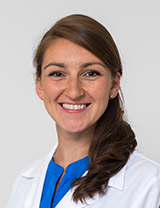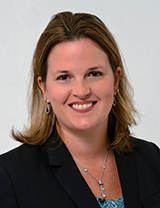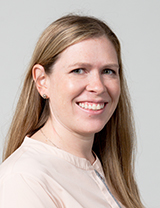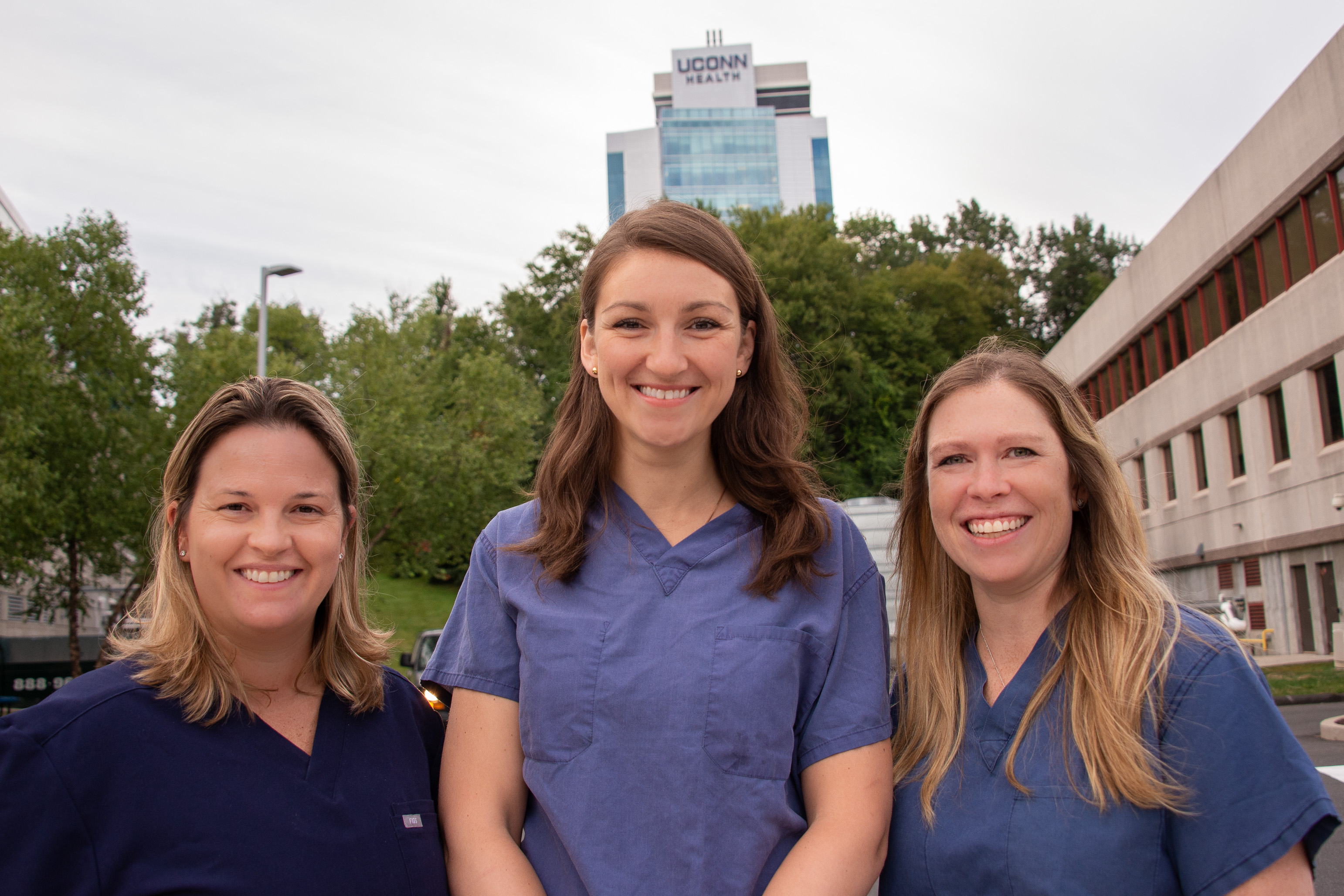While American medical schools have overcome the historic disparity between male and female physician trainees, there remain a fair amount of specialties where noticeable gender gaps persist.
One of them is orthopedic surgery, where men outnumber women by a rate of about nine to one.
At UConn Health, the ratio is closer to six to one. Dr. Lauren Geaney is a foot and ankle specialist and orthopedic residency program director, Dr. Kathy Coyner is an orthopedic sports medicine specialist and orthopedic team physician for UConn athletics, and Dr. Olga Solovyova recently arrived, specializing in hip and knee replacement. The three of them share their perspectives on being women in the field of orthopedic surgery.
What has your experience been as a woman in a male-dominated specialty?

Solovyova: I knew there was a gender discrepancy, both in orthopedic surgery as a whole and especially in my subspecialty of joint replacement. That never bothered me, but it was a bit strange to be the only female at a fellowship interview with 50 candidates. I don’t know that I really experienced any obstacles per se. Orthopedic surgery is definitely still a boys’ club, but I never felt like I was unwelcome.
Geaney: I don’t think I ever knew how male-dominated it was until I got into it. In my career, I faced more obstacles from patients and staff than I ever did from my colleagues, in the sense that it’s kind of always the running joke, the female orthopedic resident walks into the room, and the patient says, “Let me put down the phone down, the nurse is in the room.” Everyone confuses you for nursing. People don’t necessarily expect a female. My husband’s actually a nurse, ironically. There can also be a gender bias. There are times when the perception is, for a female if you’re aggressive then it’s a negative thing, if you’re a male and you’re aggressive you’re a surgeon. But I think I felt accepted from the very beginning. I feel like I didn’t maybe have as much adversity as some other people have had.
Coyner: It is a more physically demanding specialty; we’re using hammers and saws and drills and lifting big legs and putting in knee replacements and that type of stuff, so there is a physicality of it that isn’t seen in other parts of medicine. Now that being said, I’ve never once felt inferior or a lack of strength that couldn’t do something. I was actually very naïve and didn’t understand the obstacles, which probably worked to my benefit. I was the first woman through my orthopedic surgery residency in 2005, and I think I faced a lot of things without realizing it, but fortunately I sort of set the standard and it never was an issue for me. I’ve never seen myself as any different, which has probably helped me.
What drew you to orthopedic surgery?

Coyner: I’m an athlete, I played sports all growing up, I played college basketball, so I was exposed pretty young to orthopedics. That is a stereotype of orthopedics, former athletes who’ve had their bumps and bruises and have had exposure. So for me it was just, in college I worked with our orthopedic surgeon who dealt with our team, I’d go in and watch my teammates have surgery, so it just made sense to me. I’m sort of an instant-gratification-type person, you’re bone’s broke, I fix it, you go back to doing what you want, you tear your ACL, you get back to sports. It fit my personality. I like the hands-on aspect of it, from a surgical perspective.
Geaney: The mechanics of it always drew me. I’ve always liked working with my hands so that was a lot of it. I had suspected that I wanted to do it early and I was here, and I was fortunate that I got into Dr. [Gus] Mazzocca’s lab early, in my first and second years as a medical student, so I got exposed early. And this is an environment where I never felt different, they never treated me different. There are some programs that we know are very male-dominated and it makes it hard on women, where as here, I’ve never had that problem, so it made it easy.
Solovyova: I always thought that I wanted to be a doctor since I could walk. I had done some bench research in a cardiac physiology lab when I was an undergrad, and it was horribly boring. I was on the rowing team, and I went to our team physician, and I said, “Are you doing any research?” He said, “There are two great guys at the Health Center, Gus Mazzocca and Bob Arciero, they do lots of research. I’ll set you up and they can find a project for you.” I went into a lab meeting, and after, they said, “Let’s go over into the biomechanics lab, and here’s a shoulder of a cadaver, and you’re going to dissect it. Leave these muscles and take those, we’re going to use it for a study.” I did that, and I dissected a couple more shoulders, and I thought, “This is what I’m going to do with my life, that’s it.”
How would you describe the importance of mentors and a support system for a young woman who’s training to be an orthopedic surgeon?

Geaney: It’s huge in a lot of ways. I think it’s very important to have mentors so that you recognize that you can do it. That was really important to me. It was not just orthopedic women, since there weren’t many orthopedic surgeons I knew who were female, but I could see other general surgeons, that they have a family, they’re productive, they’re good doctors, and they can do it all. Just knowing that somebody can do it makes you feel like you can do it as well. The other is support; I couldn’t have two kids without my parents nearby, picking up the kids when they’re sick. It’s more than just your support at work. To have the community really supporting you is I think essential to be able to get what you need out of your career and out of your life.
Solovyova: I think it’s huge. Someone who is invested and interested in teaching you and having you be excited about the profession or specialty. You take away different things from different people and gradually blend those into who you want to become. It’s hard if you go out and look for a mentor, but occasionally you’ll stumble across someone and really have a connection with them. At least that’s been my experience.
Coyner: I think everybody needs mentors in multiple facets of their life, whether that’s professionally, personally, emotionally, and I think you can have many different mentors. That’s what I try to educate students on, is that you don’t just have to have one mentor, you can have mentors that facilitate different time periods in your life, or different situations in your life. I didn’t have a lot of female mentors who were orthopedic surgeons, so I found men who embraced me and my career. But I think having a same-sex mentor is very important, especially when young medical students are exploring that opportunity, because if they look at a tall white male former athlete, and they can’t see themselves in that person, I think they’re less likely to even explore that opportunity.
From your perspective and leaders and mentors in UConn’s orthopedic surgery residency program, what is being done to encourage young women to consider orthopedic surgery, or other historically male-dominated specialties?
Coyner: The biggest thing is seeing someone like yourself in the position, having mentors who can then facilitate younger generations. I like to tell future generations that it’s more about finesse than brute strength. I think especially with our techniques and implants and everything today, that’s not an issue. But it’s a perceived issue. It’s a perceived issue about family, it’s a perceived issue about what your life will be like as part of this mainly all-boys club. And I think we’ve broken through those barriers and now it’s our responsibility to help the next generation.
Geaney: Lack of female role models and lack of exposure have been a big part of the gender imbalance. Dr. Coyner’s really been working hard on getting our medical students exposed early, doing the Perry Initiative, getting them interested while they’re in high school. We think that getting them early is going to make them interested, make them realize they can do it. We’re trying to foster that a little bit.
Coyner: A lot of the work that I do here is about just exposing them to that and allowing them to make an educated decision, besides being just completely closed off because the people who don’t look like them. Dr. Geaney and I have created some programs to expose women to all aspects of surgery. We have quarterly seminars allowing the students – and it’s all women, so lots of questions that you probably wouldn’t ask in a co-ed situation – to ask about having kids and having families and how do you do it and when should you do it, things that probably wouldn’t come up if there were other people in the room.
And I can’t say enough about Gus Mazzocca. I was in practice for five and a half years prior to coming of UConn, and he’s really changed my life in regards to his ability to believe in one’s mission. He has completely supported my mission to educate the next generation of female orthopedic surgeons, and has really embraced that and has facilitated the ability to do that. I think it’s important to find a champion like him and have him on your side, or her on your side, hopefully.
What is your advice to girls and young women who are considering a career in orthopedic surgery, or more broadly, medicine or science?
Solovyova: Just do it. I think it’s a great field. You get to help people. You go to work with a purpose every day. And it doesn’t have to be surgery. If you like things that are more hands-on, sure, surgery’s awesome, but by no means do you need to know what specialty or subspecialty you want to be in when you decide on medicine. No matter where you end up, no one is ever going to treat you exactly the same, because you’re not the same as anyone. Some people will treat you better, some people will treat you worse, but you kind of hope that ends up being a wash in the end. If you work hard and love what you do, people will respect you.
Geaney: The important thing is, you can do it, and you can do it all. You need a good support system, there’s no question, but you can have a family, you can be a surgeon, you can be successful, you can do research if that’s what interests you. So I think it’s really important to find someone, and it can be male or female, who’s done what you want to do, and reach out. I’d say the other thing that’s important is, if you have any interest, to pursue it early. Shadow, or just make a phone call, because you don’t want to find out that you missed an opportunity. Take every opportunity that you can and explore all the different options. And you have to be able to pick what bothers you. If you really let the small things get you down, you’re going to really struggle. You have to pick your head up and know that you’re better than what people think sometimes.
Coyner: One thing my experience taught me about myself is resilience. No matter what you do in medicine to get through medical school and residency, it takes a lot. You’re going to have to sacrifice a lot of personal things you may enjoy for certain periods of time. I think it’s just about finding something that you love and finding somebody who can support you and show you an accurate representation of it.
Learn more about orthopedic surgery at the UConn Musculoskeletal Institute.



